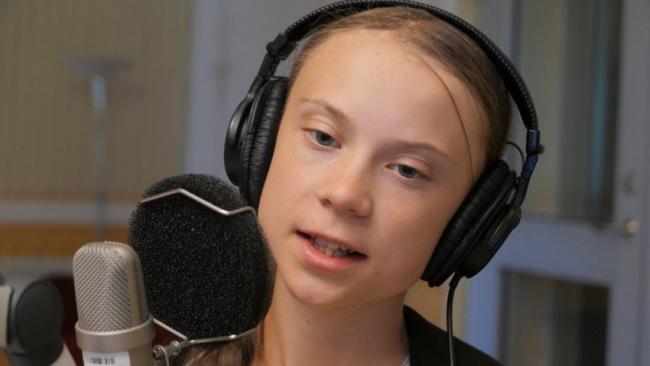Articles Menu

June 30, 2020
In her new 75-minute podcast entitled Humanity has not yet failed — recorded under the COVID-19 lock down — Swedish climate activist Greta Thunberg explains that there is no solution to the climate crisis without system change.
“The climate and ecological crisis cannot be solved within today's political and economic systems. That is not an opinion, that's a fact,” she says, with typical bluntness.
You could skip to the final chapter of her podcast and hear her spell out the argument for this stark conclusion, but that would be a mistake. If you listen to the whole podcast you will see the consistency of her stance, as she describes her epic journey to the United States to address the 2019 United Nations Climate Action Summit, where she made her iconic "How Dare You" speech.
Thunberg recounts her scathing assessment of all the world leaders who feign admiration for her climate activism and yet fail to act responsibly, her eight-sentence submission to the US House Select Committee on the Climate Crisis, and her long journey across the US and back home.
She also discusses the COVID-19 pandemic.
Thunberg says the pandemic may teach the world something about the nature of crisis and give us some insights into how to act in an emergency.
In the face of this pandemic, countries have been forced to focus on addressing urgent needs and to find the resources to do so.
“In a crisis, we are forced to rapidly change behaviour, to adapt to the new situation thrown up by the crisis.”
According to the world's experts on biodiversity, Thunberg warns, the COVID-19 pandemic “is likely to be followed by even more deadly and destructive disease outbreaks, unless their root cause, the rampant destruction of the natural world, is rapidly halted”.
“But these are not the scientists and experts they are listening to. Long-term sustainability doesn’t fit inside today’s economic and political systems.”
Thunberg also spells out her reasoning for the impossibility for real climate solution without system change.
“If all countries were to go through with the emission reduction targets they have set up as goals, we will still be heading for a catastrophic global temperature rise of at least 3–4º [Celsius]. The people in power have already practically given up on the possibility of handing over a decent future to coming generations — given up without even trying,” says Thunberg.
“It sounds terrible, I know, but in reality it is even worse. Because even if they want to act in line with what is actually needed, which is sometimes the case, they can't. And that is because we are stuck in already written contracts and business agreements.
“It's just simple maths. The UN [Emissions] Gap Report shows that the world's planned fossil fuels production up to the year 2030 counts for 120% more than what would be consistent with a 1.5º target. It just doesn't add up.
“So if we are to avoid a climate catastrophe, we have to make it possible to tear up contracts and abandon existing deals and agreements on a scale we can't even begin to imagine today. And that alone requires a whole new way of thinking since those sorts of actions are not politically, economically or legally possible today.
For this reason, Thunberg is ambivalent about the discussions around “green deals”.
“Of course there is no green recovery plan or deal in the world that alone would be able to achieve such emission cuts," she said. "And that is why the whole green deal debate ironically risks doing more harm than good, as it sends a signal that the changes needed are possible within today’s societies. As if we could, somehow, solve the crisis without treating it like a crisis.”
The final chapter in her podcast is entitled “Hope”, which is, on the surface, surprising given her grim assessment of the situation.
“A lot may have happened in the last two years, but changes and the level of awareness required are still nowhere in sight.
“Things may look dark and hopeless but I am telling you there is hope and that hope comes from the people, from democracy, from you, from the people who are starting to realise the absurdity of the situation.
“The hope does not come from politics, business or finance and that is not because politicians or business people are evil, but because what is needed right now seems to be too uncomfortable, unpopular and unprofitable.”
While the level of mass awareness is still too low, Thunberg argues, there are signs of change and awakening.
“Take the Me Too movement, Black Lives Matter or the School Strike movement, for instance. It is all interconnected. We’ve passed a social tipping point. We can no longer look away from what our society has been ignoring for so long, when it is equality, social justice or sustainability.
“From a sustainability point of view, all political and economic systems have failed but humanity has not yet failed.
“The climate and ecological emergency is not primarily a political crisis. It is an existential crisis completely based on science. The science is there. The numbers are there. We cannot get away from that fact. Nature doesn’t bargain. You cannot compromise with the laws of physics. We either accept that, understand the reality as it is or we don’t. Either we go on as a civilisation or we don’t.
“Doing our best is no longer good enough. We must now do the seemingly impossible.”
[Top photo: In her new podcast Thunberg spells out the impossibility for real climate solutions without system change. Image: Greta Thunberg/Twitter]